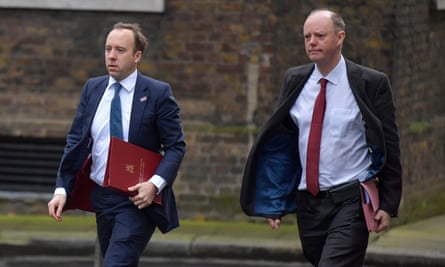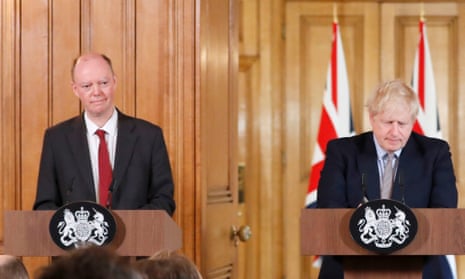To the broader public, Prof Chris Whitty, the chief medical officer for England, has emerged as the calm voice of authority, the clear-headed expert at the helm of the nation’s strategy to fend off coronavirus. But in medical circles, Whitty has long been regarded as a legend. Those who work with him speak in glowing terms: amazing, extraordinary, fantastic, brilliant, though perhaps not so good at tennis.
Such plaudits were not always on the cards, it seems. In a lecture at the London School of Hygiene and Tropical Medicine, soon after he was made a professor, Whitty put up a copy of his school report. “Don’t think about sending this boy to university, he can barely read,” one audience member recalls it saying.
David Mabey, professor of communicable diseases at the LSHTM, has held a clinic with Whitty for more than 10 years, seeing travellers who have returned from abroad with unpleasant exotic diseases. They met when Mabey interviewed a 29-year-old Whitty for a medical registrar position. Whitty was down to the final two, the other applicant being a medic in their 40s who had done everything the interviewers could ask for. “Chris hadn’t done as much, but there was something about him that said we’ve got to recruit him, and we did,” Mabey said.
Before long, that something led him to Westminster, where Whitty’s role is now as crucial as it is transformative. He embodies the return of the expert to the national conversation almost four years after the then Vote Leave campaigner Michael Gove declared: “People in this country have had enough of experts.”
The now de facto deputy prime minister’s words were directed at economists who were warning of the adverse impact of Brexit, but they had a populist resonance among Brexit voters and prompted a dangerous wave of anti-expert commentary.
Whitty’s calm and measured approach, a prerequisite for any professional dealing in evidence, seems to have come as a shock to some commentators in the Westminster bubble. “He is properly impressive,” one journalist told the website Politico.

In an era in which the currency of experts has become so devalued, it appears Downing Street has realised they have some use. On Tuesday, Boris Johnson was flanked by scientists as he explained the government’s coronavirus “battle plan”.
The Huffington Post’s political editor, Paul Waugh, praised the fact the experts’ “26-page ‘action plan’ was caveated and cautious throughout, just like the two experts – Whitty and the chief scientific adviser to the government, Sir Patrick Vallance – themselves, and provided a welcome contrast to the overheated rhetoric that often passes for much political debate in parliament”.
Whitty spent much of his childhood in northern Nigeria. His father worked for the British Council but was shot dead in Athens when Whitty was a teenager, in an apparent case of mistaken identity. Whitty still speaks warmly of Nigeria, colleagues say, and those childhood days may have shaped his passion for global health. In 2008, he was awarded $40m (£31m) by the Bill and Melinda Gates Foundation for malaria research in Africa.
A year later, Whitty, a doctor and epidemiologist (a scientist who studies the pattern of diseases), was appointed chief scientific adviser to the Department for International Development (DfID). Given the seniority of the position, the security services had some questions about the new hire. “Why is he not married,” was one that surprised colleagues most, as it seemed to come from another era.
Regardless of Whitty’s marital status, not having children may at least have freed up time for his impressive list of achievements, Mabey speculates. Beyond his medical, research and teaching commitments – students are said to regard him as an excellent lecturer – he gained a law degree and an MBA in his spare time.
If the coronavirus outbreak puts Whitty in the spotlight, that is unlikely to faze him, colleagues say. After the DfID role, Whitty became the chief scientific adviser to the Department of Health, but he doubled up as acting chief scientific adviser to the government when the military nerve agent, novichok, was used on the streets of Salisbury. Whitty is also head of the National Institute for Health Research. “He’s fine with the pressure,” Mabey said.
Though Whitty works hard, clocking up 16-hour days, he is known for his sense of humour. In 2017, he gave the Harveian Oration, a yearly lecture at the Royal College of Physicians. At the time, his boss was Dame Sally Davies, herself then England’s chief medical officer, who had warned months before against drinking any amount of alcohol.
The lecture was meant to end at 6.30pm and at 6.29pm, Whitty said he was wrapping up on the advice of Davies so as not to encroach on drinking time. “He’s willing to go for a drink and talk about things. And he likes a game of tennis,” Mabey said, adding the sport wasn’t his strongest point.
“Thank God he’s where he is to maintain some sense of sanity about all this coronavirus business,” Mabey added. “He’s an absolutely extraordinary, brilliant man. They couldn’t have a better person in charge. He’s exactly the man we need.”
